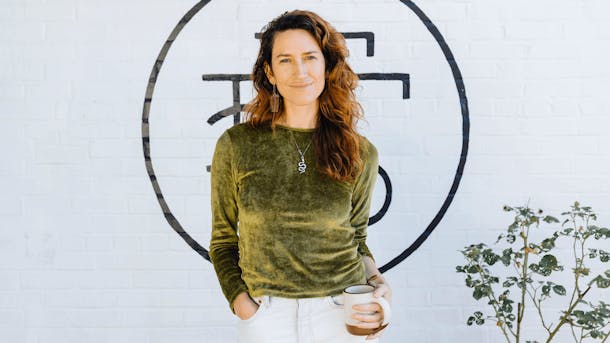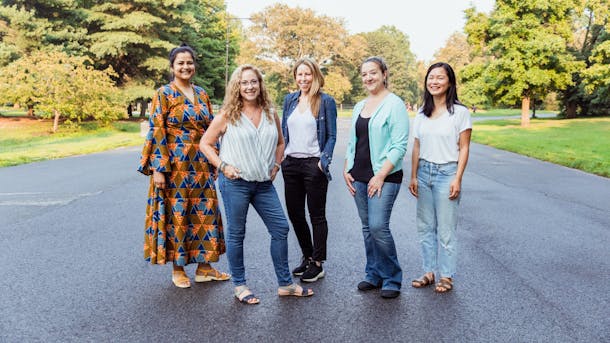
Feature Story
Three founders who turned personal stories into impactful businesses
The founders of Hurdle, Clementine, and Ringorang were inspired by their own experiences to launch businesses that improve the mental health of others.
For founders Kevin Dedner, Kim Palmer, and Robert Feeney, helping people improve and prioritize mental health is more than a business mission — it’s personal.
Hurdle provides people of color with licensed therapists who receive evidence-based training to improve cultural humility and responsiveness. Clementine, meanwhile, is a company that supports and helps women reduce anxiety, self-doubt, and inner chatter to positively shift their mindsets. Finally, Ringorang partners with companies to empower their employees to foster healthier behaviors — not least behaviors that are conducive to mental wellness.
Being the founders of apps and companies that focus on mental health and wellness isn’t the only commonality between these three. Ultimately, it was the mental health challenges they each faced that inspired them to build their businesses in the first place.
Read on to get inspired by these founders’ personal stories and business journeys.
Kevin Dedner, Hurdle
For Kevin Dedner, MPH, an innate drive to help people has long been his core motivator. “I have always been driven by an intrinsic belief that everyone deserves to live a life where they are not only inspired to be the best version of themselves, but are given an equitable opportunity to do so,” he said. Kevin is the founder and CEO of Hurdle, a teletherapy service created specifically for people of color who continue to face steep cultural and racist barriers to accessing and experiencing effective mental healthcare. As a Black man, Kevin has experienced such hurdles firsthand — and it’s this, coupled with his extensive background in public health and policy, that led to founding Hurdle.
After graduating from the University of Arkansas in 2000 with a political science degree, Kevin’s career began on the political campaign trail. He joined Al Gore’s presidential campaign and was appointed deputy director of the Black American outreach effort. But when Gore lost out in the presidential race, Kevin pivoted to work in public health — first for the American Cancer Society, and then for a string of organizations, including the Arkansas Department of Public Health and the Robert Wood Johnson Foundation. In these roles, he focused on tackling health issues like HIV/AIDS, childhood obesity, and tobacco control.
By 2012, Kevin had founded and was successfully leading his first business, Forward Solutions, a government contracting firm specializing in national public health engagements and social issues. But in February of that year, when 17-year-old Trayvon Martin was killed by George Zimmerman — and Zimmerman was ultimately acquitted of second-degree murder — it was a tipping point for Kevin.
“It literally made me sick. I was getting headaches everyday,” Kevin said. "Once the headaches stopped, I took a step back, and from a place of intellect, I found myself wanting to understand the mental health implications of this stress for Black men."
A few years later, when Kevin wanted to address some of his own mental health challenges, navigating the mental healthcare system turned out to be grueling — an experience that isn’t unique, but rather systemic.
“When I first sought out therapy, I didn’t know what was wrong. I simply felt like I wasn’t myself, like I didn't have control over my own life,” he explained. “I now understand that I was experiencing debilitating depression, worsened by the pressure of trying to be perfect in a racialized world where the odds were stacked against me.”
The American Psychiatric Association has underlined that only one in three Black people in America who need mental healthcare actually receive it, and, when they do, they receive a poorer quality of care.
“Through my own experiences — and later hearing the stories of countless women and men I met through my research whose journeys mirrored mine — I learned that therapy is not built for people of color, even though many of us need it to cope with the world we live in,” Kevin noted. “So when, in 2017, my now-co-founder Oliver Sims asked me if I'd ever considered launching something in the digital health space, I already knew the problem I wanted to tackle.”
He wanted to make it easier for people of color in America to access effective mental healthcare, with healthcare professionals delivering care that actively honors and centers culture.

I learned that therapy is not built for people of color, even though many of us need it to cope with the world we live in.
With their mission solidified, Kevin and Oliver officially launched Hurdle — then known as Henry Health — in 2018. For the next two years, the co-founders worked to raise the necessary capital and dug into impactful research and development. In that time, they designed a proof of concept and created the scientific, evidence-based framework to train therapists employed by the company to successfully address issues of race, ethnicity, class, and culture.
The training, which is the heart of Hurdle’s mission, improves the cultural responsiveness and humility of their licensed therapists via education and coaching — directly informed by the co-founders’ research. “Hurdle logged nearly 1,000 hours of therapy with patients from all walks of life,” Kevin said. “The more work we did, the more we realized just how deeply rooted this problem was in the American healthcare system.”
In 2020, Henry Health formally rebranded to Hurdle, a name directly referencing the invisible barriers Black Americans and other underrepresented groups face due to systemic racism and oppression. As part of the rebrand, they implemented a new business-to-business model that enables insurers and employers to tap into Hurdle’s services. Employers can supply their staff with individual, couple, and family therapy in addition to wellness workshops and access to Hurdle’s very own self-care mobile app, which offers benefits and programs like culturally sensitive guided meditations.
Today, two years since their rebrand, Hurdle has taken giant strides: They're rapidly expanding with the mission to be in every state by end 2023, they’ve secured $5 million in seed funding, and they’ve been hosting a Black mental health symposium for two years running — all while improving the lives of the many people of color who use Hurdle’s therapists (over 15,000 therapy sessions have been held to date).
Each milestone, Kevin said, has continued to fuel his and the company’s purpose: “I’m proud of the way we’ve stayed true to our mission, meeting the current moment with creativity, leadership, and compassion,” he shared. “As we continue to grow, I’m committed to making sure that every person we help receives the same high-quality care and that we remain laser-focused on our mission and vision.”
Up against an inequitable mental healthcare system, Kevin and his team are doing vital — and sometimes exhausting — work in breaking down those invisible barriers. But a dedication to their purpose means prioritizing their own mental health along the way. “We know that for us to maximize our impact, we must make sure we stay healthy ourselves,” Kevin said. To that end, the team is intentionally building a company culture that supports employees’ mental health. Initiatives like “Friday Wins” meetings, which highlight employee successes, and “Wellness Wednesdays,” where guest wellness experts give advice and guidance to Hurdle’s staff, help ensure that everybody’s working in a sustainable way, both today and tomorrow.
Kim Palmer, Clementine
“I think it’s super important to be open and honest about mental health struggles — it helps others to connect with their own. But I don’t think my story is that extraordinary,” said Kim Palmer, the England-based New Zealander and founder of Clementine. While Kim is undoubtedly right that owning and then sharing our mental health stories has a widespread impact, Kim’s story is decidedly extraordinary, as it led to Clementine — a company that supports and empowers women across the globe.
Clementine’s hypnotherapy-focused app aims to help women get better quality sleep, ditch self-doubt and diminish harmful inner chatter, reduce anxiety levels, boost confidence, and ultimately shift their mindsets.
Back in Wainuiomata, a suburb of Wellington, New Zealand, Kim had high hopes for the future. “I was a classic ambitious youngster. I had visions from a very young age of being some super high-powered businesswoman with a briefcase. I had no idea what that meant, but I could picture myself in a boardroom,” she reflected.
After going to school for business administration and management and then taking on roles in product management, Kim relocated to London, where she took on more senior and director-level consumer marketing positions at big-name brands — including Tesco, a large U.K. grocery chain, and Wunderman Thompson, the creative agency and consultancy.
But as Kim grew the career she had envisioned back in her childhood bedroom in New Zealand, her mental health began to suffer. “As I climbed the corporate ladder, I found myself getting promoted. But instead of feeling more confident, I developed a lot of anxiety, a lot of worries; I was a perfectionist, a people-pleaser, a workaholic,” she explained.
I wrapped all of my self-worth up in being an amazing business woman.
When she became pregnant with her first son and kept pushing for another promotion right up until her parental leave, Kim said it became clear that her trajectory wasn’t sustainable. “I didn’t physically, mentally, or emotionally look after myself, and I had my first panic attack at work. Then I unraveled. I ended up having daily panic attacks for a few years. It was dark,” she said.
To tackle her debilitating anxiety, Kim tried various therapeutic approaches. But when she tried hypnotherapy in particular — which induces a more relaxed mental state, reduces activity in the nervous system, and focuses attention — something clicked. “It was a game changer for me,” said Kim. And, she knew she wasn’t the only woman in need of the support that this kind of therapy offered.
While 1 in 6.8 people experience mental health challenges in the workplace, women working full time are almost twice as likely to face a common mental health challenge when compared to men. With this knowledge, and with her own personal experience, Kim knew she had found a tool that could really help others. She began work on the app in 2017, tapping into her extensive network to make the app a reality. And in 2019, Kim went full time with Clementine.
Over the years, Kim and her small team — which now includes women in technical, product, and marketing roles, in addition to professional therapists — have continued to develop and add to their app’s content. But they’ve always retained a focus on hypnotherapy — and a certain kind, too.
“There are different types of hypnotherapy. We chose cognitive hypnotherapy because of the blended approach it takes,” Kim said. “It includes techniques from cognitive behavioral therapy, neuro-linguistic programming, positive psychology, and hypnotherapy. The blended approach works because it means you have more tools to draw on when trying to solve specific problems.”
In the app itself, there are “sleep sessions” to help improve sleep, confidence, and calmness; courses that provide actionable tools and techniques for shifting your mindset toward positivity; and quick pick-me-up sessions for when you’re in a pinch, alongside many other nifty features.
The Clementine team has intentionally developed and tailored the app’s offerings to be accessible, quick, effective, and down-to-earth so that women can make time for their mental health even with busy schedules. For Kim, who actively dives into reviews and responds to customer queries to know what’s working well for users, it’s clear that the app is providing value.
“Last week I had someone get in touch who needed some advice on how to stop procrastinating for her exams. Then the next day it was a woman who was having problems with a work colleague treating her like crap. Today, a woman shared with me how the app played a part in her overcoming her driving anxiety,” she said.
I’m astonished daily by how we help women from all age groups, all going through so many different challenges.
While helping other people with their personal challenges, Clementine is addressing its own challenges that come with company growth. Currently, Kim and her team are thinking about how to achieve long-term growth in a financially sustainable way. “We’ve been making some really big decisions about how we want to grow our impact, which involves no longer spending to acquire customers,” she said.
One way they’re attempting to meet this goal is by collaborating with well-loved, like-minded brands. They started by working with Avanti West Coast, a train operating company serving Britain’s west coast, where passengers could access some of Clementine’s therapy as they traveled, ushering in something Kim calls “mind-powered travel.” Most recently, the team announced a partnership with No.7 — a long-running beauty product brand — where together they’re aiming to create a new type of “mind-powered ritual.”
“I suppose you could say that Clementine is the ‘mind-powered ingredient’ for brands that care about their customers’ well-being,” Kim said.
Kim and the team are clearly passionate about Clementine’s mission, which has led them to many successes so far. But Kim acknowledges that sometimes passion needs to make way for rest. “The challenge we have as a team is that everyone is so passionate that they often work a lot,” she explained. “I have to keep reminding the team to take their holidays and to not focus on perfection — it’s the killer of progress.”
Perfectionism, burnout, and their associated anxieties are things Kim is well-positioned to advise on — or rather, advise against, which helps make her an ideal leader for the team on this front. Also incredibly helpful: the honesty and transparency the team has been integrating from the start, through initiatives like their “white flag system,” which lets others know they need to hit pause on work. “I’ve used it before,” Kim said. “There’s no judgment at all.”
Robert Feeney, Ringorang
Like Kevin and Kim, Ringorang co-founder Robert Feeney is a big believer in sharing his mental health story — though it wasn’t always easy to do so. “I talk about it often now, but I didn't previously. It’s fairly dramatic, and it’s not easy to share,” Robert said. “Both my older and my younger brother died by suicide within a few years of each other. They were both struggling with a severe, hereditary bipolar condition.”
As difficult as it has been to talk about, Robert knows the benefit of being open about both his and his family’s journey. “I've realized the impact it can have when I share it, by opening up dialogue around the subject,” he said.
Around 4.4% of U.S. adults experience bipolar disorder during their lives, and research published in the scientific journal Medicina suggests the suicide rate among people with bipolar disorder is 10 to 30 times higher than the rate of the general population. His brothers’ deaths led Robert to want to help others in real, tangible ways. “It launched me on a quest: I was really interested in understanding the keys to behavior change — and how to help people develop more healthy, productive patterns.”
The first stop on Robert’s quest — though it may seem an unlikely launching point — was Hollywood. “I had very aspirational ideas about how storytelling could instigate behavior changes that could help people in their daily lives,” said Robert. The years that followed in Hollywood did in fact provide two key steps toward both understanding behavior change and launching Ringorang. First, Robert met his co-founder, BW Barkley — an entrepreneur and investor from Kansas; second, he became aware of the powerful ways that advertising affects behavior change.
“Hollywood really runs on advertising, and advertising engages you in bite-sized pieces here and there, nestled throughout your day, that prompt you to take action. You don't even notice it anymore,” Robert explained. “But what it's doing, through repetition, is using entertainment value and bringing you back to a brand or a message and building familiarity, and then that familiarity opens a door for you to try something out at a given point in your life.”
This idea of short-burst, engaging storytelling — delivered in “drips” throughout a campaign — deeply appealed to both Robert and BW. If these stories could prompt consumers to change habits and behaviors, the co-founders theorized, the potential to create change across a broad range of scenarios — including professional training and mental health and wellness — could be huge. The co-founders began to iterate on that concept and how it might be applied through technology, digging into research and development.
Ringorang, which officially launched in 2019, has continuous behavior improvement at its heart. It’s a platform made for employers who want to incrementally improve employees’ attitudes, skills, and knowledge with daily recurring (and entertaining!) drips of information. The information that’s dripped is customized by the employer, and it can relate to any type of change they want to empower their employees to make — whether they’re aiming to improve their folks’ cybersecurity knowledge or their work-life balance management.
In a business context, this positive build-up of knowledge and the fostering of healthy behaviors can enhance a workforce’s performance. But it directly boosts mental wellness at the individual level, too. For Robert, that’s an incredibly important aspect of Ringorang.
My philosophy is that a well workforce is a productive workforce — and vice versa. When you’re empowered in your career, it's incredible how much it contributes to your mental well-being.
To see the effects of Ringorang when it’s used at the very beginning of a career, the company recently partnered with WSU Tech in Wichita, Kansas — where Ringorang has been based since 2021. They’re trialing their software with student employees who are working in engineering and aerospace technology companies. It’s Robert’s thinking that Ringorang can positively shape their career trajectory by forming good habits and behaviors early on.
“These students are new to the workforce," he explained. "So what if you could offer them habits and skills to sustain their mental health and maintain work-life balance? After all, these behaviors are what give you fertile ground, mentally and emotionally, to navigate a career path with consistency and not sabotage yourself with bad habits like negative self-talk.”
While Ringorang’s pilot with WSU Tech is ongoing, the business has already clinched numerous wins that validate their software and mission: They’ve undergone rigorous (and successful) clinical trials with the U.S. Department of Energy; they’ve helped Arizona Public Service — the electric utility company — to deliver systems training to over 400 employees; and they achieved a 645% growth in revenue from the first quarter of 2021 to the second quarter of 2022, for which they won a Fire Award from the Wichita Inno.
Of course, like any startup, the work of growing the business is demanding. For Robert, who’s especially tuned in to the importance of maintaining his mental, emotional, and physical wellness each day, it's a priority to sustain healthy behavior patterns of his own. So what does he do to help show up in the healthiest way he can on a daily basis? The answer may be surprising: dancing. “I dance every day. My first career was in musical theater, so I have a dance background. I just turn on music and start dancing — it gets me going in the morning.”
Delivering on their shared mission
After navigating their own mental health struggles, the founders of Hurdle, Clementine, and Ringorang gave themselves a mission: to help others in their mental health and wellness journeys. The work they’ve done has already made an impact. And considering the founders’ determination and their focus on working in healthy, sustainable ways, it’s abundantly clear — despite whatever coming challenges there may be — that these three businesses will deliver on their missions for years to come.



